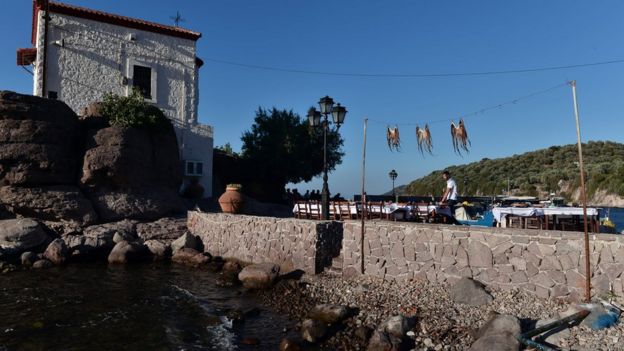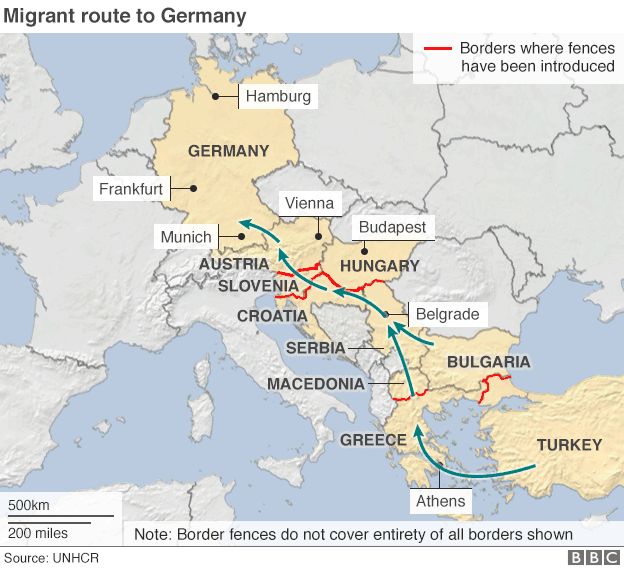Results 1 to 1 of 1
Thread Information
Users Browsing this Thread
There are currently 1 users browsing this thread. (0 members and 1 guests)
-
08-18-2016, 12:58 AM #1
 Migrant crisis: Greek islands see rising numbers in camps
Migrant crisis: Greek islands see rising numbers in camps
Migrant crisis: Greek islands see rising numbers in camps
Migrant crisis: Greek islands see rising numbers in camps
17 August 2016Europe
Save the Children says the number of migrants arriving in the Greek islands has nearly doubled in recent weeks, putting pressure on overcrowded camps.
So far in August 1,367 arrivals have been reported in Greece compared with 1,721 in the entire month of May.
The charity says the increase is partly down to insecurity since the failed coup in Turkey last month.
After more than a million migrants crossed to Europe in 2015, Turkey agreed in March to help stem the flow.
Most of the arrivals had come to the Greek islands from the west coast of Turkey.
Since the EU signed a deal with Turkey to halt the influx, the numbers have dropped dramatically but there are fears the reduction may not be sustainable.
And because of new rules that prevent irregular migrants crossing to the Greek mainland, record numbers have become stuck in increasing squalid conditions, and are becoming more angry and desperate, says the UK-based charity.
More than 10,000 migrants are currently being held on islands of Lesbos, Chios and Samos - the bulk of whom are fleeing violence and poverty in Syria, Afghanistan and Iraq.
"Mothers with small babies are being forced to sleep on the ground in makeshift tents," said Katie Dimmer, Save the Children's director of operations in Greece.
"Children and breastfeeding women are suffering from dehydration due to water shortages in some camps, and tensions are increasing as basic services, such as toilets and showers, are stretched."
Average daily arrivals on the Greek islands have risen from 56 in May to 90 in August, Save the Children says. However, the figures are dramatically down from a year ago, when 107,843 refugees and migrants arrived in Greece in August alone.
Europe's migrant crisis in numbers

Image copyrightREUTERSImage captionRefugees line up for a food handout on Lesbos
Tensions with Turkey
The summer months routinely see a rise in the number of migrants attempting to reach Europe as they take advantage of better weather conditions to make the arduous journey.
Administrative disorder in Turkey following July's attempted putsch could partly explain migrant numbers rising once again. But deteriorating Turkey-EU relations could also be a factor in the rise, say observers.
In March, the EU pledged to work towards visa-free travel for Turks to Europe's Schengen zone in exchange for Turkey's assistance in curbing migrants crossing to the Greek islands.
But after a Turkish crackdown following the attempted coup, that looks increasingly unlikely.
Imad Aoun, of Save the Children in Greece, says that has prompted Turkey to relax its pursuit of people smugglers.
"This just shows the agreement is not sustainable," Mr Aoun told the BBC. "Last year everyone was moving through the islands within days, now they are stuck and more people continue to come.

Image copyrightAFPImage captionTourism has plummeted on the Lesbos this year
"There is local fatigue and tension too. Locals rely on tourism and they are struggling to cope. This is making the situation worse.
"The route is still open unofficially. This is not being reported sufficiently. There's a fake sense of accomplishment in EU corridors and among EU leaders, as if this migration crisis has been resolved, just because the 'official numbers' are less than last year's.
"But Serbia is recording an average of 300 new arrivals entering the country unofficially every day - 9,000 per month. The Balkan route is wide open."

Migrant crisis: Greek islands see rising numbers in camps - BBC.com
Similar Threads
-
First New Concentration Camps in Europe Set to Sprout on Greek Soil
By AirborneSapper7 in forum Other Topics News and IssuesReplies: 0Last Post: 04-12-2012, 04:52 PM -
Italy says Lampedusa migrant numbers rising
By JohnDoe2 in forum illegal immigration News Stories & ReportsReplies: 1Last Post: 08-17-2011, 04:56 PM -
Migrant boat capsizes in British Virgin Islands; 5 dead
By JohnDoe2 in forum illegal immigration News Stories & ReportsReplies: 0Last Post: 12-06-2010, 02:46 PM -
Sovereign Debt Crisis: Greek Economic Crisis Coming to US
By AirborneSapper7 in forum Other Topics News and IssuesReplies: 0Last Post: 02-13-2010, 03:19 AM -
CA: Impact of migrant camps is uncertain
By Jean in forum illegal immigration News Stories & ReportsReplies: 1Last Post: 02-08-2007, 02:27 PM


 LinkBack URL
LinkBack URL About LinkBacks
About LinkBacks




 Reply With Quote
Reply With Quote

Oklahoma House passes bill making illegal immigration a state...
04-19-2024, 05:14 AM in illegal immigration News Stories & Reports